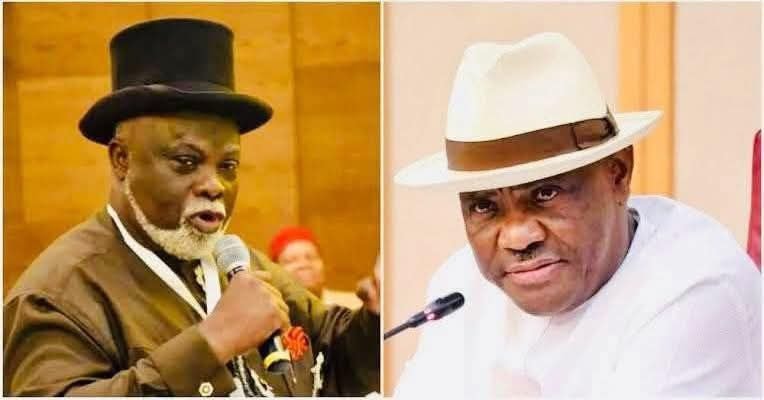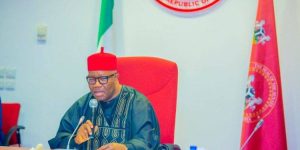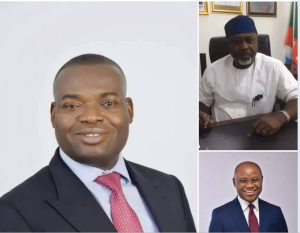Wike Mobilizes Military, Police, and Security Forces for Ministerial Visit, Allegedly Aiming to Spark Crisis and Trigger State of Emergency – nabs Sara-Igbe,
Wike came with the Army, the police, the Navy, the Air Force, the DSS, gunboats, airplanes, tanks, and artillery, all of this was mobilized for a minister’s visit with the intention of causing a crisis so that a State of Emergency could be declared.
In a turbulent political climate, the recent developments in Rivers State have brought to light serious concerns over the increasing militarization of Nigerian politics and the government’s apparent use of state power to enforce political control. His Highness Anabs Sara-Igbe, a respected political analyst and traditional ruler, recently expressed his outrage and frustration over the unfolding situation, which he believes could have far-reaching implications for the future of Nigerian democracy.
Sara-Igbe’s comments specifically target the actions of the former Governor of Rivers State, Nyesom Wike, who is now serving as the Minister of the Federal Capital Territory (FCT) under the leadership of President Bola Tinubu. Wike’s tenure as governor of Rivers State was marked by controversy, including his often combative political style and his influence within the People’s Democratic Party (PDP). However, it is his recent actions as a minister that have raised alarm, with accusations that he is using his position and political power to create instability in Rivers State and beyond.
Sara-Igbe’s remarks were particularly critical of the way Wike allegedly mobilized significant military and security resources during a visit to Rivers State, purportedly with the intention of triggering a political crisis that would allow the government to declare a State of Emergency. The accusations suggest that Wike, using his political influence and the backing of security forces, allegedly orchestrated a situation that could have spiraled out of control, potentially destabilizing the region. According to Sara-Igbe, Wike’s actions were a deliberate effort to incite unrest, creating an atmosphere of tension and chaos that would allow for greater federal intervention.
In his statement, Sara-Igbe claimed that Wike “came with the Army, the Police, the Navy, the Air Force, the DSS, gunboats, airplanes, tanks, and artillery” for what was essentially a routine visit from a minister. Such a massive deployment of military and security forces, according to the traditional ruler, was unnecessary for the purpose of a ministerial visit. Instead, the heavy mobilization of military and security forces is seen as a calculated attempt to provoke a crisis, one that could be used as a pretext to declare a State of Emergency in Rivers State, particularly given the perceived political friction between Wike and the state’s current leadership.
Sara-Igbe did not stop at criticizing Wike’s role in potentially instigating political chaos. He also turned his attention to what he perceived as a disturbing trend within the Nigerian government: the growing use of political power to undermine opposition governors who refuse to conform to the wishes of the central government. According to Sara-Igbe, the actions of Wike as a federal minister reveal a larger pattern of behavior, wherein governors who resist federal interference and attempt to govern independently are targeted and marginalized.
In his comments, Sara-Igbe expressed disbelief at the government’s failure to take action against a minister who has been accused of causing confusion and unrest, not only in the Niger Delta region but also in the North and South-South. While President Bola Tinubu, according to Sara-Igbe, has the power to remove ministers who cause disruptions, he seems unwilling to act against Wike, despite the grave nature of his alleged actions. This failure, according to the political analyst, creates a dangerous precedent that undermines the integrity of the political system.
Sara-Igbe pointed to the example of Governor Fubara of Rivers State, who has become the target of the central government’s political maneuvering. He warned that what happened to Governor Fubara could easily be applied to other states, particularly those governed by the opposition People’s Democratic Party (PDP). Sara-Igbe’s remarks underscore the growing concern that political control in Nigeria is becoming more centralized and that opposition governors who challenge the status quo will be increasingly vulnerable to political manipulation, intimidation, and removal from office.
One of the most alarming aspects of this political crisis in Rivers State, as outlined by Sara-Igbe, is the militarization of Nigeria’s political landscape. The extensive use of military and security forces to enforce political agendas or create instability is a deeply troubling development, signaling a shift toward authoritarian governance. The role of the military and security forces in Nigerian politics has always been a sensitive issue, particularly given the country’s history of military rule. When military power is used to settle political scores or suppress opposition, it undermines the principles of democracy and the rule of law.
The deployment of such a vast array of military and security resources, including tanks, artillery, and gunboats, raises serious concerns about the potential for violence and repression. While security forces are necessary to maintain order, their use for political purposes distorts their intended function and creates a chilling atmosphere where political dissent is met with force rather than dialogue or negotiation. In a democratic society, the military should be a neutral institution focused on national security, not a tool for enforcing political power or silencing opposition.
Sara-Igbe’s critique also touches on the broader issue of federalism in Nigeria and the erosion of state autonomy. Nigeria’s federal system is designed to ensure that power is shared between the central government and the states, giving regional governments the authority to govern their territories according to the needs and desires of their populations. However, Sara-Igbe believes that this delicate balance is being undermined by the federal government’s increasing interference in state affairs.
The case of Rivers State, with the alleged militarization of political visits and the growing pressure on opposition governors, highlights the risks of centralizing power at the federal level. If state governors are consistently targeted and threatened by the federal government, the very foundations of federalism could be shaken. The autonomy of state governments is a crucial aspect of Nigeria’s political system, and any attempts to erode this autonomy risk destabilizing the entire country.
The fear is that if this trend continues, it could lead to the marginalization of states that do not align with the ruling party or the central government. Governors who are perceived as defiant or unwilling to comply with federal mandates could face increased pressure, including the possible dissolution of their offices or forced compliance with federal directives. This would set a dangerous precedent, where the central government can undermine the authority of elected state officials for political gain.
The unfolding crisis in Rivers State is not just about one individual or one region; it is emblematic of a broader political struggle for control and power in Nigeria. Sara-Igbe’s comments suggest that the situation could set a precedent for how future political conflicts are handled in Nigeria. If the central government can use the military and security forces to force its will on states, then the future of Nigeria’s democracy could be in jeopardy.
For Nigeria to maintain its democratic integrity, it is crucial that state governments are allowed to function independently and that political conflicts are resolved through dialogue and negotiation, rather than through the threat or use of force. The recent events in Rivers State have shown that the current administration must work to ensure that the country’s political system remains accountable to the people and that power is not abused for partisan gain.
As the political situation in Rivers State continues to unfold, many Nigerians are calling for greater transparency and accountability in the actions of the federal government and its representatives. The use of military force for political purposes cannot be tolerated, and those responsible for instigating such actions must be held accountable. Additionally, there is a growing demand for a reexamination of the role of state governors and their autonomy within Nigeria’s federal system.
The federal government must also ensure that it upholds the principles of democracy, respect for human rights, and the rule of law. As the country moves forward, it is essential that power is exercised responsibly and that the rights of citizens are protected from political manipulation.
Ultimately, the situation in Rivers State serves as a stark reminder of the fragility of Nigeria’s democratic institutions. If the government continues to disregard the rights of state governors and their ability to govern autonomously, it could set a dangerous precedent that threatens the very foundation of Nigeria’s democracy. Political leaders, civil society organizations, and the Nigerian people must work together to safeguard the country’s democratic future and ensure that power is used for the benefit of all, not just the few in power.




